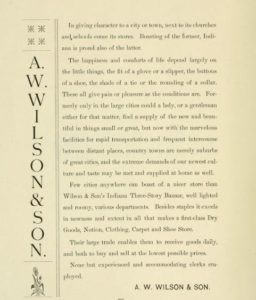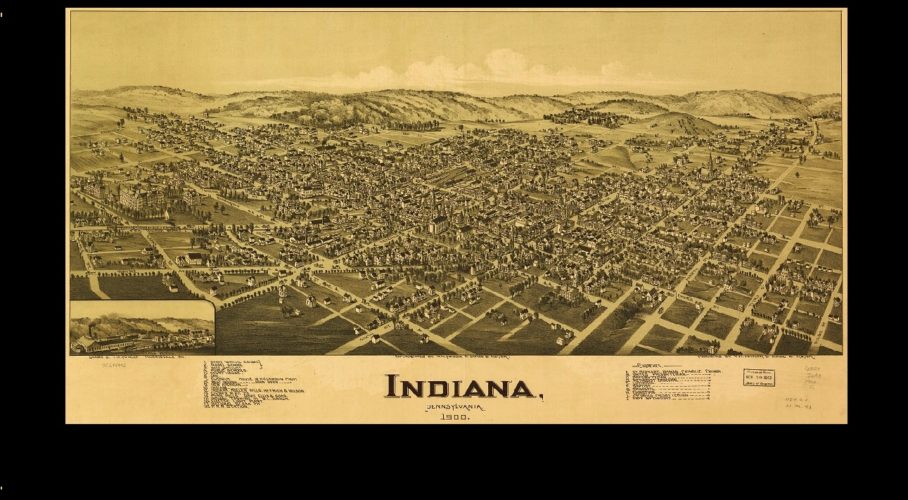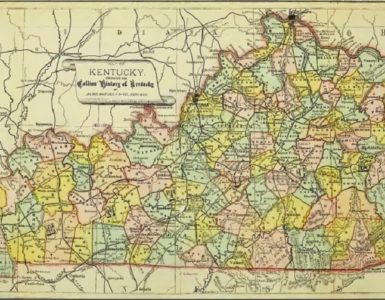 Andrew Wilkins was born July 12, 1826 in the valley of Brush Creek in Indiana County, Pennsylvania, to Samuel and Elizabeth (Wilkins) Wilson. Samuel was the son of Joseph and Martha (Patton) Wilson who moved west from Philadelphia shortly after arriving from Ireland. They settled as tenants on a one-hundred-fifty acre farm and lived in a small log cabin built by Joseph. Samuel’s early years of life were sometimes difficult because his parents did not always get along. Joseph could be irritable but at the same time he was a loving father. The Wilsons were members of the Bethel Associate Reformed Church.
Andrew Wilkins was born July 12, 1826 in the valley of Brush Creek in Indiana County, Pennsylvania, to Samuel and Elizabeth (Wilkins) Wilson. Samuel was the son of Joseph and Martha (Patton) Wilson who moved west from Philadelphia shortly after arriving from Ireland. They settled as tenants on a one-hundred-fifty acre farm and lived in a small log cabin built by Joseph. Samuel’s early years of life were sometimes difficult because his parents did not always get along. Joseph could be irritable but at the same time he was a loving father. The Wilsons were members of the Bethel Associate Reformed Church.
Andrew’s home life was better than that experienced by his father. Elizabeth Wilson was an attentive mother with a patient and gracious demeanor who enjoyed her son and the other nine children that would fill the house. As was common practice in the day she was also his first teacher when he began studies at the age of six. The Bible was his primer and writing exercises were accomplished through copying its text. Samuel taught in the school that held classes in the local Reformed Dutch Church building. The small community could not afford a dedicated facility. Andrew was baptized at the age of eight by Rev. N. C. Weed in the Wilsons’ church. Samuel’s school master income was insufficient for his family expenses so he moved to a local farm. Tilling soil was more profitable than toiling teaching students. Not long after the move Andrew’s mother became ill resulting in her death after an extended period of decline. During her last days she often read the Psalms and the works of John Bunyan for comfort. Samuel was left in a difficult situation as he worked the farm and tried to keep up the household, but because of Elizabeth’s death and her responsibilities falling to him, he distributed the children among kin for their care. It was a difficult time for Andrew and his siblings because they missed being together at home, but fortunately, Samuel was able to reunite the family when he rented a small house adjoining the residence of his uncle. Extended family provided help with housekeeping, but the cooking was done by Samuel, who according to Andrew, was a superb cook that was particularly adept at baking bread.
 When Andrew was about thirteen years old he took a job clerking in a mercantile store. It went well until the store owner gave the position to his nephew. Andrew was not happy, but he had another problem. Obtaining an education was a challenge as it was for others of his day who were strapped for funds. He sometimes could not pay tuition when school opened in the winter and then had to find a school in another city that gave classes at other times of the year. But, finally, after several sessions in different locations led by masters of varying ability, Andrew became a teacher in a school for the sparse annual sum of sixteen dollars, however his income jumped when he contracted to teach in Green Township for forty-two dollars for each of nine three-month terms. The increase in pay transformed him from a pauper to a comparative prince. Andrew was intelligent and a good worker but by 1844 prolonged stints teaching had worn him down sufficiently that he sought another profession.
When Andrew was about thirteen years old he took a job clerking in a mercantile store. It went well until the store owner gave the position to his nephew. Andrew was not happy, but he had another problem. Obtaining an education was a challenge as it was for others of his day who were strapped for funds. He sometimes could not pay tuition when school opened in the winter and then had to find a school in another city that gave classes at other times of the year. But, finally, after several sessions in different locations led by masters of varying ability, Andrew became a teacher in a school for the sparse annual sum of sixteen dollars, however his income jumped when he contracted to teach in Green Township for forty-two dollars for each of nine three-month terms. The increase in pay transformed him from a pauper to a comparative prince. Andrew was intelligent and a good worker but by 1844 prolonged stints teaching had worn him down sufficiently that he sought another profession.
Wilson enjoyed his brief stint as a store clerk when he was younger, so when he arrived in the village of Indiana in May 1844 he started looking for a job in a store. He obtained room and board and a clerk position in the dry goods store owned by John Sutton and H. M. Moore. He quickly became active in the Old School Presbyterian Church and was soon appointed to teach a class, but despite his school master experience he did not care for Sunday School teaching. Andrew enjoyed his new job, liked the store owners, and they liked him sufficiently to move him up the rungs of responsibility. The first year of work earned him one-hundred-fifty dollars of which he put a third in savings. When Moore died leaving Sutton without a business partner, Wilson was the obvious choice for a new colleague. The partnership cost him 1100.00. The prosperous business quickly resulted in construction of a new store on the village square which provided greater visibility and access for customers. And for a few years Andrew worked establishing a store in Mechanicsburg. Things were going well for Andrew Wilson because he was enjoying business success, standing in the community, and a church home.
The missing aspect of bachelor Wilson’s life was a wife and family. Just a short distance away from Indiana he made the acquaintance of Anna Graham Dick in Black Lick Township. She was a relation of John Dick (1764-1833) the Scot Presbyterian minister of Greyfriars Church in Edinburgh who was known for his defense of the plenary inspiration of Scripture and his Lectures on Theology. Andrew and Anna were married July 7, 1853. Annie, Andrew’s term of endearment, was a well educated woman who exhibited great character combined with piety, intellect, and grace. The Wilsons purchased a lot at the corner of Church and 7th Streets and built a house that would be filled with ten children. Andrew had only a few blocks to walk to his store. All things were decent and in order with a bright future for the Wilsons.
Andrew continued to be active in the Presbyterian Church as he and Annie served Christ with their abilities and time. He was an elder for over thirty years, and the Sunday School superintendent for twenty—he apparently got over his first experience with Sunday School. He was active in the greater Presbyterian Church with particular interest in education and attended presbytery meetings as well as at least one General Assembly in 1871. The proximity of Western Theological Seminary to his home and his education concerns led to his appointment to the seminary board of directors which he served for twenty years. Anna was a teacher in her church Sunday School, president of its Women’s Foreign Missionary Society, and the superintendent of mothers’ work for the Women’s Christian Temperance Union. Samuel Wilson had been active in the Washingtonian Temperance Society and Andrew was also concerned for temperance.
 Another aspect of Andrew’s educational interests was the training of teachers for public school. When the Pennsylvania Normal School at Indiana was opened May 17, 1875, Wilson had worked for its formation having been on the committee of five that developed plans for its fruition a few years earlier. Currently, Indiana University of Pennsylvania is the expansion and development of the Normal School. In 1893 Wilson Hall was constructed a model school for teachers with “eight large, airy classrooms, with ample playrooms in the basement for use on stormy days.” From 1877 until his death he was a member of the board of directors and he was the third president of the Normal School.
Another aspect of Andrew’s educational interests was the training of teachers for public school. When the Pennsylvania Normal School at Indiana was opened May 17, 1875, Wilson had worked for its formation having been on the committee of five that developed plans for its fruition a few years earlier. Currently, Indiana University of Pennsylvania is the expansion and development of the Normal School. In 1893 Wilson Hall was constructed a model school for teachers with “eight large, airy classrooms, with ample playrooms in the basement for use on stormy days.” From 1877 until his death he was a member of the board of directors and he was the third president of the Normal School.
Andrew Wilkins Wilson died June 11, 1897, after a life of retail success, investments in oil and real estate, and years of ministry as a faithful ruling elder. At the time of his passing he was president of the Board of Trustees of the Normal School. In the front page memorial to Wilson in The Normal Herald he was honored.
The school has lost in Mr. Wilson more than an honored president and an efficient trustee. He stood in the community a pillar of truth and integrity, and it was this solidity of moral character that was the foundation of the confidence reposed in him, and that made his presence in the community a wholesome influence. The trustees felt it, the teachers felt it, the students felt it and bore its effect away with them. His was a remarkable combination of penetration of thought, of gentleness amounting to diffidence, and of courage in achieving or defending the right.
Anna survived Andrew. Andrew and Annie had ten children—Harry is the son noted in the store advertisement clippings accompanying this article; Robert Dick became a seminary professor; Samuel Graham travelled to Persia ministering in missions; John Loughry became a clerk in the A. W. Wilson & Son store; A. W. Wilson, Jr., became an educator and president of the Kiskiminetas Springs School in Saltsburg; but the futures of the other children, Ella, Anna Elizabeth, James Dick, Jenny, and Aggie have not been determined. Andrew Wilkins Wilson is buried in Oakland Cemetery. Annie survived until 1912.
Barry Waugh
The header image of Indiana, Pennsylvania dated 1900 was made by T. M. (Thaddeus Mortimer) Fowler and James Moyer and is from the Library of Congress digital collection via Wikimedia Commons. The portrait is from the memorial in The Normal Herald. The store advertisements are from yearbooks published by the Indiana Normal School as on Internet Archive. It is believed that the lot currently occupied by a restaurant called The Coney at South Carpenter Avenue and Philadelphia Street in Indiana may be where the new mercantile store was constructed after Wilson became a partner with Sutton. Both buildings currently appear too new to have been built by Wilson and Sutton at that time. Sources include—D. H. Sloan, editor, A History of the Presbytery of Kittanning, of the Presbyterian Church in the United States of America with its Churches and Schools, 1888. The article “Time Travellers” in the Summer/Fall 2019 issue of IUP Magazine, which is published by Indiana University Press, tells of a visit by Wilson descendants to the university. The quote about the design of Wilson Hall is from page 26 of Thirty-Seventh Annual Catalogue of the Indiana Normal School of Pennsylvania, 1911-1912. The two-volume set Indiana County Pennsylvania Her People Past and Present, 1913, by J. T. Stewart has considerable information and some photographs.





